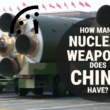Confronting unavoidable realities
By Raymund Jose G. Quilop, March 5, 2013
Let's face it: The Nuclear Suppliers Group (NSG) is widely perceived as an exclusionary mechanism. And perhaps that's what it really is. In this Roundtable, expansion of the group's membership has been a major topic of discussion, but the NSG will continue to be perceived as exclusionary even if it extends membership to all countries that possess both nuclear materials and nuclear know-how, for the simple reason that only a limited number of countries meet both those conditions.
Larger membership, far from changing negative perceptions of the group, might only indicate that the NSG has failed in its mission to discourage nuclear proliferation. That is, if any country that gains access to nuclear material and technology, no matter through what means, can ultimately become a member of the NSG, the group will have done little to control the spread of sensitive materials and technologies. Possession of nuclear material and know-how cannot be the sole criterion for gaining membership. This, in part, is why I argued in my second essay that a clear set of parameters for admitting new members to the group should be established.
My colleague Kayhan Barzegar suggests that it might be practicable to bring Iran into the NSG so that it could "share valuable lessons from its nuclear experience." But though a country like Iran may gain access to nuclear material and technology, it is not in a political position to share material and technology with other nations through nuclear commerce, which is another way of saying that it will find no place in a suppliers group. Nuclear newcomers, including Iran, could consider forming a Nuclear Users Group. But such a group would find that it had little business to conduct.
I also differ with my colleague Rajiv Nayan when he writes that nuclear commerce rather than nonproliferation should be the NSG's principal focus. Nonproliferation has always been the group's main reason for being, even if many people think the NSG has largely failed in its nonproliferation efforts, and it is my view that nonproliferation should continue in a central role.
A price too high. A question not addressed in this Roundtable so far is how vigorously developing nations should pursue nuclear energy to begin with. Nations of course have the right to develop nuclear power sectors, and my colleagues are correct in pointing out that many developing countries must increase their energy supplies if their economies are to continue maturing. But nuclear energy is often a poor choice for countries in the developing world.
Constructing nuclear power plants is not cheap. Developing the technical knowledge necessary for establishing and operating a nuclear sector isn't cheap either. If social costs like nuclear waste are figured in, nuclear power can turn out to be more expensive than other available forms of alternative energy. Some nations may choose to pursue nuclear energy because they want to join the club of countries that have mastered nuclear technology, but if that is the prize, it is quite an expensive prize to pursue.
The NSG itself must face a troublesome fact: Nations with nuclear ambitions, if they cannot obtain nuclear material or technology through the group, will probably be able in this day and age to obtain what they want somewhere else. This is the real challenge facing the Nuclear Suppliers Group.
Topics: Nuclear Energy, Nuclear Weapons
Share: [addthis tool="addthis_inline_share_toolbox"]














